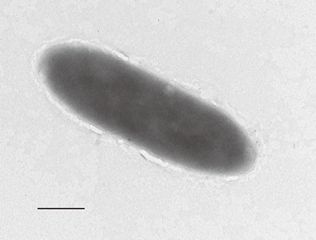
An international team of researchers has discovered a new group of oil-eating bacteria in the mysterious ecosystem of the Mariana Trench, according to a study published in the journal Microbiome.
Located in the Western Pacific, the deepest part of the trench lies a staggering 36,200 feet below sea-level. If you were to place Mount Everest at the bottom, the peak would still be around 7,000 feet from the surface.
Because it is so difficult to access, there have only been a handful of expeditions to date investigating the organisms that live in this harsh environment—where the pressure in some parts can reach the equivalent of 2,400 pounds pressed onto a single fingernail. In fact, scientists say that we know more about Mars than we do about this strange deep-sea ecosystem.
"The Mariana Trench is one of the least studied environments on Earth and there is limited information on how microorganisms survive this unique environment," David Lea-Smith, an author of the study from the University of East Anglia in England, told Newsweek. "Our original goal was to determine the biochemical processes that microorganisms use to survive this environment. For example, what food source do they use and how they might survive the extreme pressure conditions?"
In an attempt to address this lack of knowledge, the research team collected samples of microbes in the deepest part of the trench using submersible technology. These samples were then analyzed, allowing them to identify a new group of bacteria that degraded hydrocarbons—organic compounds made from hydrogen and carbon atoms found in many places, including crude oil and natural gas.
A key finding of the study was that the hydrocarbon-degrading bacteria made up a high proportion of the microbes in this environment.
"We were shocked that hydrocarbon degrading bacteria constituted such a large proportion of the total microbial population, far higher than anywhere else on Earth," Lea-Smith said. "This suggests that high amounts of hydrocarbons are present in the Mariana Trench, which these bacteria then use as a food source."
According to Lea-Smith, we know that similar hydrocarbon degrading organisms—which have been found in nearly every environment on Earth—play a major role in consuming oil released in events such as the Deepwater Horizon rig explosion in the Gulf of Mexico.
"These bacteria may play a role in consuming any oil that reaches the ocean floor which limits pollution in this environment," he said.
In fact, the authors suggest that a significant proportion of the oil-degrading bacteria that they found in the trench derives from pollution on the surface of the ocean. Surprisingly, they also found naturally occurring hydrocarbons in the ocean sediment at the bottom of the trench.
"We were also surprised that there are other organisms synthesizing hydrocarbons," Lea-Smith said. "While I have established that algae and photosynthetic bacteria also produce hydrocarbons at the ocean surface from my previous work, these are different from the compounds we found in the Mariana Trench. This suggests that the microbes at the bottom of the Mariana Trench are using a different type of biochemistry to synthesize these hydrocarbons."
The researchers think that these hydrocarbons could help some microbes to survive the crushing pressures near the bottom of the trench, while also acting as a food source for others. However, more research is needed to shed light on the organisms living here.
"In future work, we are very interested in determining the biochemical process by which certain microorganisms in the Mariana Trench produce hydrocarbons," Lea Smith said. "These hydrocarbons are similar to the compounds found in diesel fuel. If we can identify this pathway, then we could introduce it into other bacteria or yeast to produce biofuels, which may replace diesel currently produced from fossil fuels."
Uncommon Knowledge
Newsweek is committed to challenging conventional wisdom and finding connections in the search for common ground.
Newsweek is committed to challenging conventional wisdom and finding connections in the search for common ground.
About the writer
Aristos is a Newsweek science reporter with the London, U.K., bureau. He reports on science and health topics, including; animal, ... Read more
To read how Newsweek uses AI as a newsroom tool, Click here.








